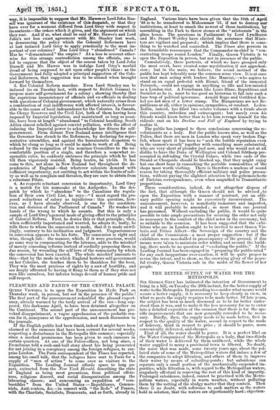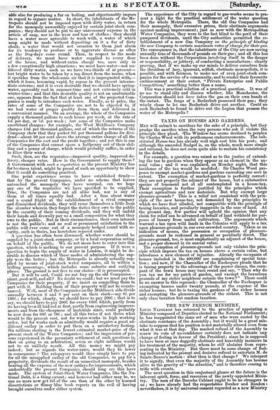THE BETTER SUPPLY OF WATER FOR THE METROPOLIS. Sin GEORGE
GREY has intimated the intention of Government to bring in a bill, on Tuesday the 29th instant, for the better supply of
water to the Metropolis. In proceeding to consider what means would secure a better supply, it is necessary to keep clearly in view, in, what repects the supply requires to be made better. Of late years,. the subject has been so much discussed as to be far better under- stood than it was, and to make it the less necessary for us to enter into a detailed exposition of the occasion that there is for the spe- cific improvements that are now generally conceded to be neces- sary. Briefly, then, the supply needs to be made better, first in respect to the evality of the water, second in respect to the mode of delivery, third in respect to price ; it should be purer, more conveniently delivered, and cheaper. First of all, the water should be purer. It is a perfect libel on the Water Companies of the Metropolis as a body, that two-thirds of their water is delivered by them unfiltered, while the whole water supplied to many a provincial town is filtered. No doubt, the noise that was made, some twenty years ago, about the pol- luted state of some of the Metropolitan waters did induce a few of" the companies to adopt filtration, and others of them to improve their water by means of subsiding-ponds ; but subsidence can separate only a small portion of the mechanically-suspended im- purities, while filtration is, with regard to the Metropolitan waters,, singularly effectual in removing the rest of this kind of impurity.. Prolonged subsidence, indeed, cannot be practised with the Metro- politan waters, especially in warm weather, without polluting them by the rotting of the sludgy matter that they contain. Then there is no doubt, with reference to such matters as the waters hold in solution, that the waters are objectionably hard; objection-
able also for producing a far on boiling, and objectionably impure in regard to organic matter. In short, the inhabitants of the Me-
tropolis should not be imposed upon with dirty water, in return
for the monopoly, unworthily enjoyed by certain joint-stock com- panies; they should not be put to any unnecessary expense in the
article of soap, nor in the wear and tear of clothes ; they should have a water more agreeable to wash with, a water of which soup might be made without depositing on it a fur of dirty chalk, a water that would not occasion to them just alarm
for its tendency to produce or to aggravate disease as often as the Dog-days come round. Then, in respect to the mode
of delivery, we must have water supplied to every floor of the house, and without extra charge too, save only in a few exceptionally high situations ; we must have water—not un-
filtered dirty water' such as we have two-thirds of at present-- but bright water tobe taken by a tap direct from the mains, when it sparkles from the wholesome air that it is impregnated with,— which it loses, becoming vapid, by repose in the present interme- diate cisterns; and it is even desirable that we should have spring- water, agreeably cool in summer-time and not extremely cold in winter-time ; and that this desirable quality is not an unattainable one, appears from the fact that at least one of the projected Com- panies is ready to introduce such water. Finally, as to price, the rates of some of the Companies are not to be objected to, if we had water of proper quality from them and delivered in
convenient manner. On an average, the whole of the Companies supply a thousand gallons to each house per week, at the rate of id. per day, or 7d. per week ; but some of the Companies make exorbitant charges : for example, the West Middlesex Company charges 13d. per thousand gallons, out of which the returns of the Company show that they pocket 9d. per thousand gallons for divi- dend—about 30 per cent above the average entire charge of all the Companies for the cost and the profit together ; and yet this is one of the Companies that cannot spare a halfpenny out of their shil- ling and a penny of charge, which would probably suffice, in order to filter their water.
Such, then, are the requisites—improved quality, improved de- livery, cheaper rates. How is the Government to supply these ? A Government with such a reputation as the present Ministry, has for business talent, might be proud of such an opportunity to show that it could do something practical. One point experience seems to have established firmly— that by the present Companies, under no scheme that leaves untouched the monopoly they have usurped, can we hope any one of the requisites we have specified to be supplied. True, the Companies are not all alike bad, nor is any of them at all times equally bad. After a fuss about water and a sound fright at the establishment of a rival company land diminished dividends, they will rouse themselves a little from the slumber wherein they forget the duties they owe to the public in the security of their coming dividends, and they will unfold their hands and drowsily pay us a small composition for what they owe to the public. But in their circumstances, their own interest is not the public's ; and no real or permanent satisfaction to the public will ever come out of a monopoly hedged round with se- curity, such as theirs has heretofore reposed under.
A question has often been discussed, whether water should be • supplied by a joint-stock company, or by a local corporation acting on behalf of the public. We do not mean here to enter into this question, which is nothing to our present purpose. If it were a question to begin the supply of water in London, it might be de- sirable to discuss which of those modes of administering the sup- ply were the better ; but the Metropolis is already actually sup- plied by means of joint-stock water companies, all to within a trifling percentage which includes some suburbs and. outlying places. The ground is not free to our choice—it is preoccupied. But it will be said, Could we not buy up the old Companies— plant, good-will, and all? No doubt we could ; but we must pay the • C4mpanies for their property, if we insist on compelling them to part with it. Robbing them of their property will not be counte- nanced. Well, most of the Companies on the Middlesex side divide - annually between 6 and 9 per cent on their stock—say 8/. per 1001.; for which, clearly, we should have to pay 2001.; that is to say, we should have to pay 200/. for every. 100/. which, partly from its having been ill laid out at first, partly from engineering improve- ments and from the cheapness of materials since, could probably be now done for 60/. or 701.; and all this twice if not thrice what would be the present cost, not for water-works in high working order, but for works such as admittedly would require a great ad- ditional outlay in order to put them on a satisfactory footing. Six millions sterling is the lowest estimated market-price of the present stock of the Water Companies ; and the impression of per- sons experienced in the pecuniary settlement of such questions is, that on going to an arbitration, seven or eight millions would not be an unlikely result. All this money we might pay indeed ; but as regards the water-rates, would they be lower in consequence ? The ratepayers would thus simply have to pay for all the misapplied outlay of the old Companies, to pay for a perpetuity, dividends the result of an unmerited monopoly, besides bearing all the expense of the new outlays for improvements, which undoubtedly the present Companies should long ere this have made. The system of Jeint-Stock Water Companies, like the Na- tional Debt, is a thing extant ; and however bad either may be, we can no more now get rid of the one than of the other by learned dissertations or flimsy blue book reports on the evil of having brought ourselves under either system.
The experience of the City in regard to gas-works seems to pre- sent a light for the practical settlement of the water question for the whole Metropolis. There, the old Gas Companies had their monopoly, their excessive prices, their obstinate arguments against making improvement; just as now with the Metropolitan Water Companies, they were to the last blind to the peril of their pampered dividends, until the City authorities permitted the es- tablishment of a new Gas Company on the principle of binding the new Company to certain maximum rates of charge for their gas. The consequence is, that the inhabitants of the City are now saving annually tens of thousands of pounds on their gas ; and all this has been done without the Corporation involving itself in the danger or responsibility, or jobbery, of conducting a manufacture : clearly proving, that if we make up our minds to deliver ourselves from the thraldom of lazy, ignorant, selfish, obstinate monopolists, it is possible, and with fairness, to make use of even joint-stock com- panies for the service of a community, and to render their favourite emblazonment at their outset, "Private Enterprise and Public Competition," something better than a name.
This was a practical solution of a practical question. It was of no use to stand idly and discuss whether, like Manchester, the Corporation should not have taken the gas on their own hands at the outset. The fangs of a Beelzebub possessed their gas ; they wisely chose to let one Beelzebub drive out another. Could no such Beelzebub be found to drive out the Legion that possess the water of the Metropolis ?



























 Previous page
Previous page